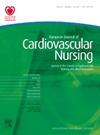心脏移植术后并发症:回顾性队列研究
IF 2.9
3区 医学
Q2 CARDIAC & CARDIOVASCULAR SYSTEMS
引用次数: 0
摘要
引言 原发性移植物功能障碍、移植物排斥反应、肾功能障碍和感染是心脏移植(HT)后经常出现的并发症,有证据表明,既往的合并症和危险因素,如动脉高血压、糖尿病、血脂异常和吸烟,会导致甚至加重这些疾病的发生和发展。目的 本研究验证了既往合并症和危险因素与高血压术后并发症发生之间的关联。方法 采用回顾性队列研究方法,纳入了巴西一家医院在 1988 年至 2020 年期间收治的 91 例高血压术后患者,并进行了长达 10 年的术后随访。该研究是根据加强流行病学观察性研究报告(STROBE)的建议设计的。数据通过回顾性分析病历收集。自变量如下受试者术前的人口统计学和临床状况,如年龄、性别、动脉高血压、糖尿病、血脂异常和吸烟。结果变量为急性细胞排斥反应、感染、肾功能障碍、HT 术后血液透析治疗和死亡。数据进行了描述性分析、费雪精确检验和卡方分析,统计显著性水平为 p < 0.05。该研究获得了当地伦理委员会的批准(CAAE:53026321.4.0000.5404)。结果 女性居多(67.0%),平均年龄为 49.4 (11.1)岁。大多数患者被诊断患有高血压(49.45%)、吸烟(38.46%)、血脂异常(18.68%)和糖尿病(16.48%)。在并发症方面,73.63%的样本患者出现急性细胞排斥反应,61.54%的患者出现感染,25.47%的患者出现肾功能障碍,此外还有24.18%的患者在接受HT后接受了血液透析治疗。一半以上的患者死亡(58.24%)。研究发现,肾功能不全与高血压(P=0.0018)、急性细胞排斥与吸烟(P=0.0386)以及感染与吸烟(P=0.0156)之间存在高度正相关。此外,还观察到出现肾功能不全的患者与血液透析有很大关系(p<0.0001)。结论 本研究表明,高血压可能与肾功能障碍的发生有关,吸烟可能导致高血压后急性细胞排斥和感染。这些研究结果为医护人员在术后实施预防策略和早期发现并发症提供了支持。本文章由计算机程序翻译,如有差异,请以英文原文为准。
Complications in the postoperative period of heart transplantation: a retrospective cohort
Introduction Primary graft dysfunction, graft rejection, renal dysfunction, and infections are frequent complications after heart transplantation (HT), and there is evidence that previous comorbidities and risk factors, such as arterial hypertension, diabetes, dyslipidemia, and smoking can predispose or even aggravate the development and evolution of these disorders. Objectives This study verified the association between previous comorbidities and risk factors in the development of complications after HT. Methods A retrospective cohort study was conducted and included 91 HT patients and followed up to 10 years postoperatively, in a Brazilian hospital between 1988 and 2020. The study was designed according to the recommendations of Strengthening the Reporting of Observational Studies in Epidemiology (STROBE). Data were collected by retrospective analysis of medical records. The independent variables were the following: Demographic and clinical conditions of the subjects during the preoperative period, such as age, sex, arterial hypertension, diabetes, dyslipidemia, and smoking. The outcome variables were: Acute cellular rejection, infection, renal dysfunction, hemodialysis therapy after the HT, and death. Data were submitted to descriptive, Fisher’s Exact Test and Chi-square analyses, with p < 0.05 as the level of statistical significance. The local Ethics Committee approved the study (CAAE: 53026321.4.0000.5404). Results There was a predominance of women (67.0%), with a mean age of 49.4 (11.1) years. Most of them were diagnosed with hypertension (49.45%), smokers (38.46%), dyslipidemia (18.68%), and diabetes (16.48%). Regarding complications, 73.63% of the sample of this study developed acute cellular rejection, 61.54% had infections, 25.47% developed renal dysfunction, in addition to 24.18% of patients received hemodialysis treatment after HT. More than half of patients died (58.24%). Positive associations of strong magnitude were found between renal dysfunction and hypertension (p=0.0018); of moderate magnitude between acute cellular rejection and smoking (p=0.0386) and between infection and smoking (p=0.0156). Furthermore, it was observed that those who developed renal dysfunction had a high association with hemodialysis (p<0.0001). Conclusion This study demonstrated that hypertension may be associated with the development of renal dysfunction, and smoking may contribute to acute cellular rejection and infection after HT. These findings provide support to health professionals to implement prevention strategies and early detection of complications in the postoperative period.
求助全文
通过发布文献求助,成功后即可免费获取论文全文。
去求助
来源期刊

European Journal of Cardiovascular Nursing
CARDIAC & CARDIOVASCULAR SYSTEMS-NURSING
CiteScore
5.10
自引率
10.30%
发文量
247
审稿时长
6-12 weeks
期刊介绍:
The peer-reviewed journal of the European Society of Cardiology’s Council on Cardiovascular Nursing and Allied Professions (CCNAP) covering the broad field of cardiovascular nursing including chronic and acute care, cardiac rehabilitation, primary and secondary prevention, heart failure, acute coronary syndromes, interventional cardiology, cardiac care, and vascular nursing.
 求助内容:
求助内容: 应助结果提醒方式:
应助结果提醒方式:


